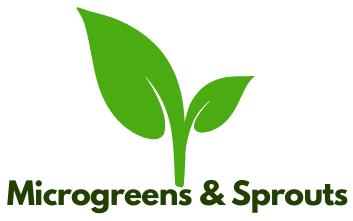Basil
Basil Seeds
Basil seeds, often called sabja or tukmaria seeds, are tiny black seeds harvested from the sweet basil plant (Ocimum basilicum). When soaked in water, they develop a gelatinous coating that makes them popular for sprouting and adding texture to drinks, salads, and various dishes. Basil sprouts have a mild, fresh flavor with a hint of sweetness.
History of the Seed
Basil seeds have been used for centuries in traditional medicine and cooking, especially in India, Southeast Asia, and the Middle East. They were originally prized for their cooling properties and digestive benefits. Over time, their use expanded beyond culinary applications to health and wellness, including sprouting for fresh nutrient-rich greens.
Nutritional Information
- Calories: Approximately 20 calories per tablespoon (dry seeds)
- Carbohydrates: 3-4 grams
- Fiber: 3 grams
- Protein: 1-2 grams
- Fat: Less than 1 gram (mostly healthy fats)
- Vitamins: Vitamin K, Vitamin A, Vitamin C
- Minerals: Calcium, Magnesium, Iron, Potassium
Nutrition Benefits
- Rich in dietary fiber supporting digestion
- Contains antioxidants to help reduce inflammation
- Good source of plant-based protein
- Provides essential minerals for bone health and metabolism
- May help regulate blood sugar levels
Sprouting Process and Directions
Soak Time
Soak basil seeds in cool water for 15-30 minutes until they swell and develop a gel-like coating.
Rinse Time
Rinse the soaked seeds gently with fresh water at least 2 times per day to prevent mold.
Growing Time
Spread the soaked seeds evenly on a sprouting tray or jar after rinsing.
Harvest Time
Basil sprouts are usually ready to harvest in 5-7 days when they have developed small green leaves.
Yield
From 1 tablespoon of basil seeds, you can expect about 1 cup of fresh basil sprouts.
Days to Sprout
Seeds typically begin sprouting within 1-2 days after soaking.
Best Growing Methods
- Use shallow trays with good drainage or sprouting jars with mesh lids.
- Keep in indirect sunlight or under fluorescent lights.
- Maintain a temperature between 65°F and 75°F (18°C – 24°C).
- Avoid overwatering; keep sprouts moist but not waterlogged.
Storage
Once harvested, basil sprouts should be stored in a sealed container in the refrigerator and consumed within 3-5 days for best freshness.
Using the Ready Sprouts
- Add to salads for a fresh flavor and crunchy texture.
- Use as a topping for sandwiches and wraps.
- Mix into smoothies for added nutrients.
- Garnish soups and stir-fries.
Helpful Tips
- Rinse seeds thoroughly before soaking to remove dust.
- Use filtered or distilled water to avoid chlorine exposure.
- Avoid direct sunlight during sprouting to prevent overheating.
- Use organic basil seeds when possible for best quality.
Did You Know?
Basil seeds absorb up to 10 times their weight in water, forming a gel that aids hydration and digestion when consumed. This property makes them popular in cooling summer drinks in many Asian countries.
